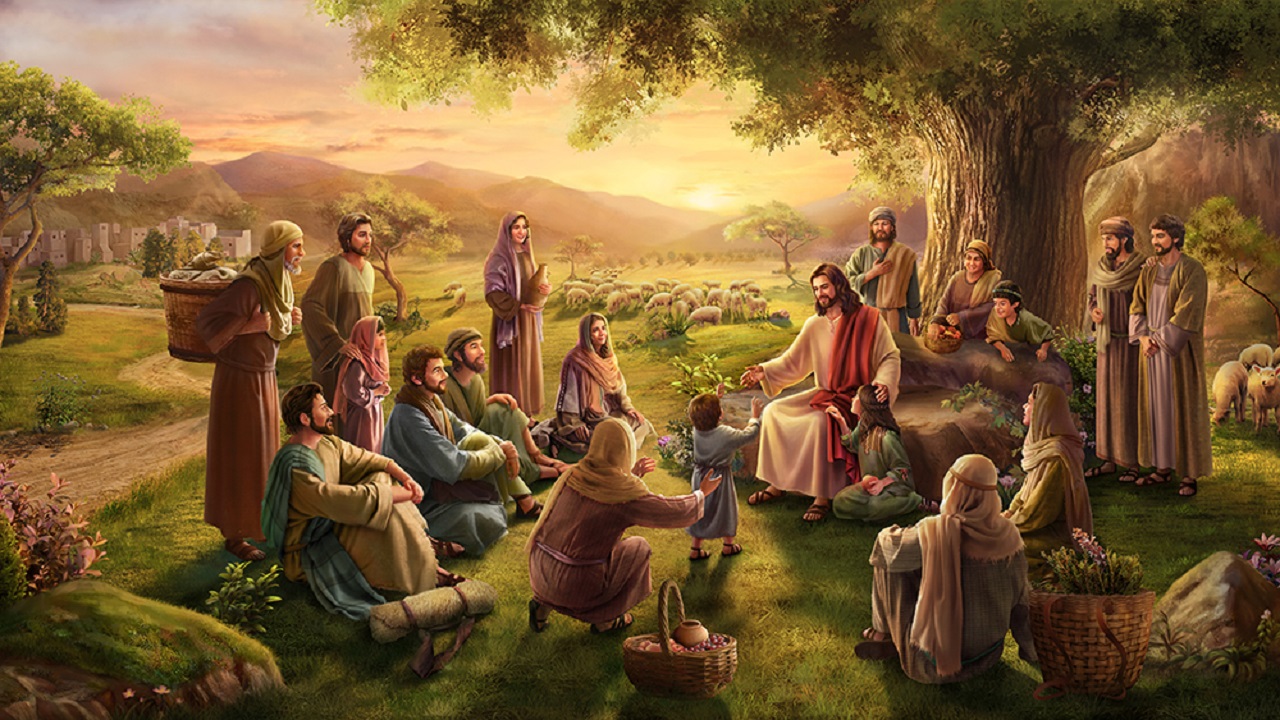
1. (Mat 12:1) At that time Jesus went on the sabbath day through the corn; and his disciples were an hungered, and began to pluck the ears of corn and to eat.
2. (Mat 12:6-8) But I say to you, That in this place is one greater than the temple. But if you had known what this means, I will have mercy, and not sacrifice, you would not have condemned the guiltless. For the Son of man is Lord even of the sabbath day.
Let’s first take a look at this passage: “At that time Jesus went on the sabbath day through the corn; and his disciples were an hungered, and began to pluck the ears of corn and to eat.”
Why have we selected this passage? What connection does it have to God’s disposition? In this text, the first thing we know is that it was the Sabbath day, but the Lord Jesus went out and led His disciples through the corn fields. What’s more “outrageous” is that they even “began to pluck the ears of corn and to eat.” In the Age of Law, Jehovah God’s laws were that people could not casually go out or take part in activities on the Sabbath—there were many things that could not be done on the Sabbath. This action on the part of the Lord Jesus was puzzling for those who had lived under the law for a long time, and it even provoked criticism. As for their confusion and how they talked about what Jesus did, we will put that aside for now and first discuss why the Lord Jesus chose to do this on the Sabbath, of all days, and what He wanted to communicate to people who were living under the law through this action. This is the connection between this passage and God’s disposition that I want to talk about.
When the Lord Jesus came, He used His practical actions to communicate to people: God had departed the Age of Law and had begun new work, and this new work did not require observation of the Sabbath; when God came out from the confines of the Sabbath day, this was just a foretaste of His new work, and His truly great work was continuing to play out. When the Lord Jesus began His work, He had already left behind the shackles of the Age of Law, and had broken through the regulations and principles from that age. In Him, there was no trace of anything related to the law; He had cast it off entirely and no longer observed it, and He no longer required mankind to observe it. So here you see that the Lord Jesus went through the corn fields on the Sabbath; the Lord did not rest, but was outside working. This action of His was a shock to people’s conceptions and communicated to them that He no longer lived under the law, and that He had left the confines of the Sabbath and appeared in front of mankind and in their midst in a new image, with a new way of working. This action of His told people that He had brought with Him new work that began with going out from the law and going out of the Sabbath. When God carried out His new work, He no longer clung to the past, and He was no longer concerned about the regulations of the Age of Law. Neither was He affected by His work in the previous age, but He worked as usual on the Sabbath and when His disciples were hungry, they could pick ears of corn to eat. This was all very normal in God’s eyes. God could have a new beginning for much of the work that He wants to do and the things that He wants to say. Once He has a new start, He neither mentions His previous work again nor continues it. For God has His principles in His work. When He wants to begin new work, it is when He wants to bring mankind into a new stage of His work, and when His work has entered a higher phase. If people continue to act according to the old sayings or regulations or continue to hold fast to them, He will not commemorate or praise this. This is because He has already brought new work, and has entered a new phase of His work. When He initiates new work, He appears to mankind with a completely new image, from a completely new angle, and in a completely new way so that people can see different aspects of His disposition and what He has and is. This is one of His goals in His new work. God does not hold on to the old or take the beaten path; when He works and speaks it’s not as prohibitive as people imagine. In God, all is free and liberated, and there is no prohibitiveness, no constraints—what He brings to mankind is all freedom and liberation. He is a living God, a God who genuinely, truly exists. He is not a puppet or a clay sculpture, and He is totally different from the idols that people enshrine and worship. He is living and vibrant and what His words and work bring to humans is all life and light, all freedom and liberation, because He holds the truth, the life, and the way—He is not constrained by anything in any of His work. No matter what people say and no matter how they see or assess His new work, He will carry out His work with no qualms. He will not worry about anyone’s conceptions or fingers pointed at His work and words, or even their strong opposition and resistance to His new work. No one among all of creation can use human reason, or human imagination, knowledge, or morality to measure or define what God does, to discredit, or disrupt or sabotage His work. There is no prohibitiveness in His work, and it will not be constrained by any man, thing, or object, and it will not be disrupted by any hostile forces. In His new work, He is an ever-victorious King, and any hostile forces and all heresies and fallacies from mankind are all trampled under His footstool. No matter which new stage of His work He is carrying out, it must be developed and expanded in mankind’s midst, and it must be carried out unhindered in the entire universe until His great work has been completed. This is God’s almightiness and wisdom, and His authority and power. Thus, the Lord Jesus could openly go out and work on the Sabbath because in His heart there were no rules, and there was no knowledge or doctrine that originated from mankind. What He had was God’s new work and His way, and His work was the way to free mankind, to release them, to allow them to exist in the light, and to allow them to live. And those who worship idols or false gods live every day bound by Satan, restrained by all kinds of rules and taboos—today one thing is prohibited, tomorrow another—there is no freedom in their lives. They are like prisoners in shackles with no joy to speak of. What does “prohibition” represent? It represents constraints, bonds, and evil. As soon as a person worships an idol, they are worshiping a false god, worshiping an evil spirit. Prohibition comes along with that. You can’t eat this or that, today you can’t go out, tomorrow you can’t turn your stove on, the next day you can’t move to a new house, certain days must be selected for weddings and funerals, and even for giving birth to a child. What is this called? This is called prohibition; it is bondage of mankind, and it is the shackles of Satan and evil spirits controlling them, and restraining their hearts and bodies. Do these prohibitions exist with God? When speaking of the holiness of God, you should first think of this: With God there are no prohibitions. God has principles in His words and work, but there are no prohibitions, because God Himself is the truth, the way, and the life.
Now let’s look at the following passage: “But I say to you, That in this place is one greater than the temple. But if you had known what this means, I will have mercy, and not sacrifice, you would not have condemned the guiltless. For the Son of man is Lord even of the sabbath day” (Mat 12:6-8). What does “temple” refer to here? To put it simply, “temple” refers to a magnificent, tall building, and in the Age of Law, the temple was a place for priests to worship God. When the Lord Jesus said “in this place is one greater than the temple,” who did “one” refer to? Clearly, “one” is the Lord Jesus in the flesh, because only He was greater than the temple. What did those words tell people? They told people to come out of the temple—God had already come out and was no longer working in it, so people should seek God’s footsteps outside of the temple and follow His steps in His new work. The background of the Lord Jesus saying this was that under the law, people had come to see the temple as something greater than God Himself. That is, people worshiped the temple rather than worshiping God, so the Lord Jesus warned them not to worship idols, but to worship God because He is supreme. Thus, He said: “I will have mercy, and not sacrifice.” It is evident that in the eyes of the Lord Jesus, most people under the law no longer worshiped Jehovah, but were merely going through the process of sacrificing, and the Lord Jesus determined that this process was idol worship. These idol-worshipers saw the temple as something greater, and higher than God. In their hearts there was only the temple, not God, and if they lost the temple, they lost their dwelling place. Without the temple they had nowhere to worship and could not carry out their sacrifices. Their so-called dwelling place is where they operated under the banner of worshiping Jehovah God, allowing them to stay in the temple and carry out their own affairs. Their so-called conducting sacrifices was just to carry out their own personal shameful dealings under the guise of conducting their service in the temple. This was the reason people at that time saw the temple as greater than God. Because they used the temple as a cover, and sacrifices as a guise for cheating people and cheating God, the Lord Jesus said this to warn people. If you apply these words to the present, they are still equally valid and equally pertinent. Although people today have experienced different work of God than people in the Age of Law experienced, the essence of their nature is the same. In the context of the work today, people will still do the same type of things as “the temple is greater than God.” For example, people see fulfilling their duty as their job; they see bearing witness to God and battling the great red dragon as political movements in defense of human rights, for democracy and freedom; they turn their duty to utilize their skills into careers, but they treat fearing God and shunning evil as nothing but a piece of religious doctrine to observe; and so on. Aren’t these expressions on the part of humans essentially the same as “the temple is greater than God”? Except that two thousand years ago, people were carrying out their personal business in the physical temple, but today, people carry out their personal business in intangible temples. Those people that treasure rules see rules as greater than God, those people that love status see status as greater than God, those that love their career see career as greater than God, and so on—all their expressions lead Me to say: “People praise God as the greatest through their words, but through their eyes everything is greater than God.” This is because as soon as people find an opportunity along their path of following God to display their own talents, or to carry out their own business or their own career, they distance themselves from God and throw themselves into the career that they love. As for what God has entrusted to them, and His will, those things have long been discarded. In this scenario, what is different about these people and the ones conducting their own business in the temple two thousand years ago?
Next, let’s take a look at the last sentence in this passage of scripture: “For the Son of man is Lord even of the sabbath day.” Is there a practical side to this sentence? Can you see the practical side of this? Every single thing that God says comes from His heart, so why did He say this? How do you understand it? You may understand the meaning of this sentence now, but at the time not many people did because mankind had just come out of the Age of Law. For them, coming out from the Sabbath was a very difficult thing to do, not to mention understanding what a true Sabbath is.
The sentence “the Son of man is Lord even of the sabbath day” tells people that God’s everything is immaterial, and although God can provide all of your material needs, once all of your material needs have been met, can the satisfaction from these things replace your pursuit of truth? That is clearly not possible! God’s disposition and what He has and is that we have fellowshiped about are both the truth. It cannot be measured with the heavy price of material objects nor can its value be quantified with money, because it is not a material object, and it supplies the needs of each and every person’s heart. For every person, the value of these intangible truths should be greater than the value of any material things you think are nice, right? This statement is something you need to linger over. The key point of what I’ve said is that what God has and is and God’s everything are the most important things for every single person and they cannot be replaced by any material object. I’ll give you an example: When you’re hungry, you need food. This food can be relatively good or relatively lacking, but as long as you have your fill, that unpleasant feeling of being hungry will no longer be there—it will be gone. You can sit there in peace, and your body will be at rest. People’s hunger can be resolved with food, but when you’re following God and feel that you have no understanding of Him, how can you resolve the emptiness in your heart? Can it be resolved with food? Or when you’re following God and don’t understand His will, what can you use to make up for that hunger in your heart? In the process of your experience of salvation through God, while pursuing a change in your disposition, if you don’t understand His will or don’t know what the truth is, if you don’t understand God’s disposition, don’t you feel very uneasy? Don’t you feel a strong hunger and thirst in your heart? Don’t these feelings prevent you from feeling peace in your heart? So how can you make up for that hunger in your heart—is there a way to resolve it? Some people go shopping, some find their friends to confide in, some people sleep their fill, others read more of God’s words, or they work harder and expend more effort to fulfill their duties. Can these things resolve your actual difficulties? All of you fully understand these kinds of practices. When you feel powerless, when you feel a strong desire to gain enlightenment from God to allow you to know the reality of truth and His will, what do you need most? What you need isn’t a full meal, and it’s not a few kind words. More than that, it’s not the transient comfort and satisfaction of the flesh—what you need is for God to directly, clearly tell you what you should do and how you should do it, to clearly tell you what the truth is. After you’ve understood this, even if it’s just a tiny bit, don’t you feel more satisfied in your heart than if you had eaten a good meal? When your heart is satisfied, doesn’t your heart, your whole person, gain true peace? Through this analogy and analysis, do you understand now why I wanted to share with you this sentence, “the Son of man is Lord even of the sabbath day”? Its meaning is that what comes from God, what He has and is, and His everything are greater than any other thing, including the thing or the person you once believed you treasured most. That is to say, if a person cannot have words from the mouth of God or they do not understand His will, they cannot gain peace. In your future experiences, you will understand why I wanted you to see this passage today—this is very important. Everything that God does is truth and life. The truth for mankind is something that they cannot lack in their lives, that they can never do without; you could also say that it’s the greatest thing. Although you can’t look at it or touch it, its importance to you cannot be ignored; it is the only thing that can bring peace to your heart.



